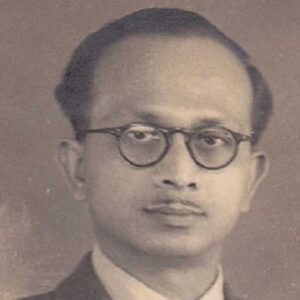Diptendu Pramanick, a native of Calcutta (now called Kolkata), the capital of West Bengal, started his professional life as the mayor’s secretary. Despite having a science degree at the time, he showed an interest in literature. He gradually established himself as a familiar presence at all citywide literary events and festivals. He worked under the direction of renowned journalist Ramanada Chatterjee as a member of the 12th Prabasi Banga-Sahitya Sammelan’s welcome committee. This well-known Calcutta native and graduate of “Asutosh College” served in the Civil Defense Service for a short while before pursuing a career in film. He was a business-minded individual who first established his own modest business, “Cine Furnishers Limited,” before joining the renowned “Bengal Motion Pictures Association.” Under his direction, the BMPA broadened its scope and gave rise to the Eastern India Motion Pictures Association. Also established was a new journal under the ‘BMPA’ banner, with the film character serving as the editor for more than 20 years. The “EIMPA” played a significant role in the “Film Advisory Committee,” which the Indian government established. In the 1950s, it aided in addressing the shortage of unprocessed film stock, and it now helps the movie business with legal difficulties like piracy and sponsorship.
Early Childhood & Life
On July 18, 1910, in Calcutta, Diptendu was born to Bengali lawyer Sudhamoy Pramanick and his wife Swarnabala.
He began his basic schooling in a Calcutta-area school before transferring to the Raiganj Coronation School in West Bengal’s Raiganj town. In 1926, Diptendu returned to Calcutta and successfully completed his matriculation exams. He passed his Intermediate exams two years later, with a science focus.
He enrolled in the “Scottish Church College” in Calcutta the same year, 1928, but quit the school after an argument with a professor. He then enrolled in “Asutosh College,” where he graduated with a bachelor’s in science in 1931.
Diptendu Pramanick’s Career
Pramanick worked as Sri Santosh Kumar Basu’s secretary in 1934 while he was the mayor of Calcutta. The young man began attending literary conferences frequently since he was interested in Bengali literature.
He was a member of the reception committee for the annual literary convention known as the 12th Prabasi Banga-Sahitya Sammelan. The renowned author Rabindranath Tagore opened the meeting, which took place in 1934, in Calcutta.
When Sri Santosh Kumar Basu’s tenure as mayor came to an end in 1942, Diptendu was hired as a liaison officer by the Civil Defence. During World War II, the Civil Defence was in charge of making sure that civilians were safe. When the Second World War came to an end, the department was disbanded, and Diptendu was fired.
After working for the Civil Defense department for a while, Pramanick founded “Cine Furnishers Limited” with a couple of his buddies. During this time, he developed close relationships with notable figures in Bengali cinema.
He began working for the Bengal Motion Pictures Association, which represented Bengali film producers and distributors, in 1948 as its secretary. Sri Birendranath Sircar, an Indian film producer and recipient of the “Dada Saheb Phalke Award,” served as the association’s president.
Diptendu created and served as editor of the Bengal Motion Pictures Association’s journal, the BMPA Journal, in 1949. Under Pramanick’s leadership, the group prospered and expanded with additional branches in the cities of Guwahati and Patna.
The film personality served as the extended association’s secretary, and the office was moved to its current address of “98E B.N. Sircar Sarani” where it is now known as the “Eastern India Motion Pictures Association” (or “EIMPA”).
The government established a “Film Advisory Committee” in response to a shortage of raw film used for filmmaking in India. “EIMPA” was crucial in handling the distribution of raw film stock, and Diptendu was in charge of sourcing and distributing supplies for the entire eastern Indian film industry.
The “Films Division of the Government of India” hosted the first “International Film Festival of India” in 1952. The event was handled by “BMPA” in Calcutta, and the arrangements greatly impressed the occasion’s distinguished visitor, American director Frank Capra.
This well-known Bengali film personality was chosen to serve as the “Film Federation of IndiaSecretary “‘s in the years 1953–1954. The first film conference was established in Delhi the following year by Pandit Jawaharlal Nehru, the Indian Prime Minister, at the invitation of the Sangeet Natak Akademi, where Pramanick was a distinguished visitor.
This resourceful figure from the world of film was the Joint Treasurer of Satyajit Ray’s Oscar-winning Bengali film Federation of Film Societies of India in 1959.
The self-funded “BMPA Journal,” which the Bengali cinema fan continued to manage, was published till the end of the 1960s.
He participated in several film committees during the start of the following decade, serving as a consultant on different Bengali cinema-related topics.
His Bigger Works
Throughout his career, Diptendu Pramanick held a variety of roles in the film industry, but he is best known for founding the Eastern India Motion Pictures Association, a branch of the Bengal Motion Pictures Association, and serving as that organization’s secretary for many years.
Personal Legacy & Life
Son Subrata and his daughter Eva survive this prominent figure in Bengali cinema, who passed away on December 15, 1989, in Calcutta.
He inspired the creation of the “Diptendu Pramanick Book Fund,” which offers free textbooks to Dahuka village students in the Bardhaman district of West Bengal.
Estimated Net Worth
The estimated net worth of Diptendu Pramanick is $10 million, with NA being his primary source of income. The proof supporting Diptendu Pramanick’s lifestyle and vehicles is insufficient. We’ll shortly be updating this information.
Trivia
Similar to liberation warrior Netaji Subhash Chandra Bose, this member of the Bengali film industry was a nationalist who was ejected from the “Scottish Church College” for beating a professor who displayed anti-Indian prejudice.


